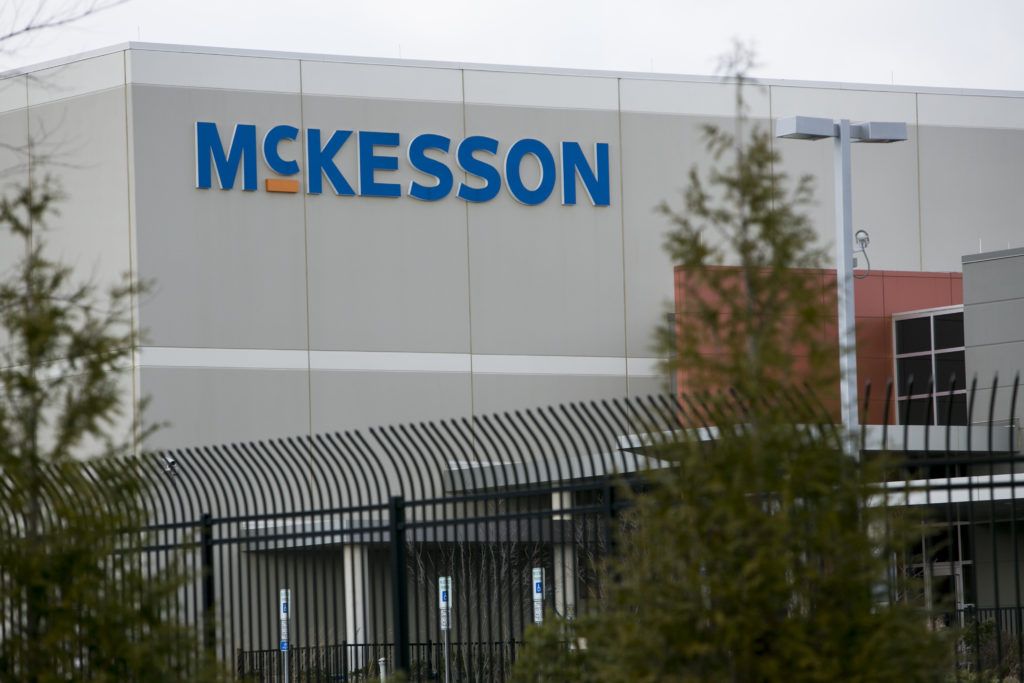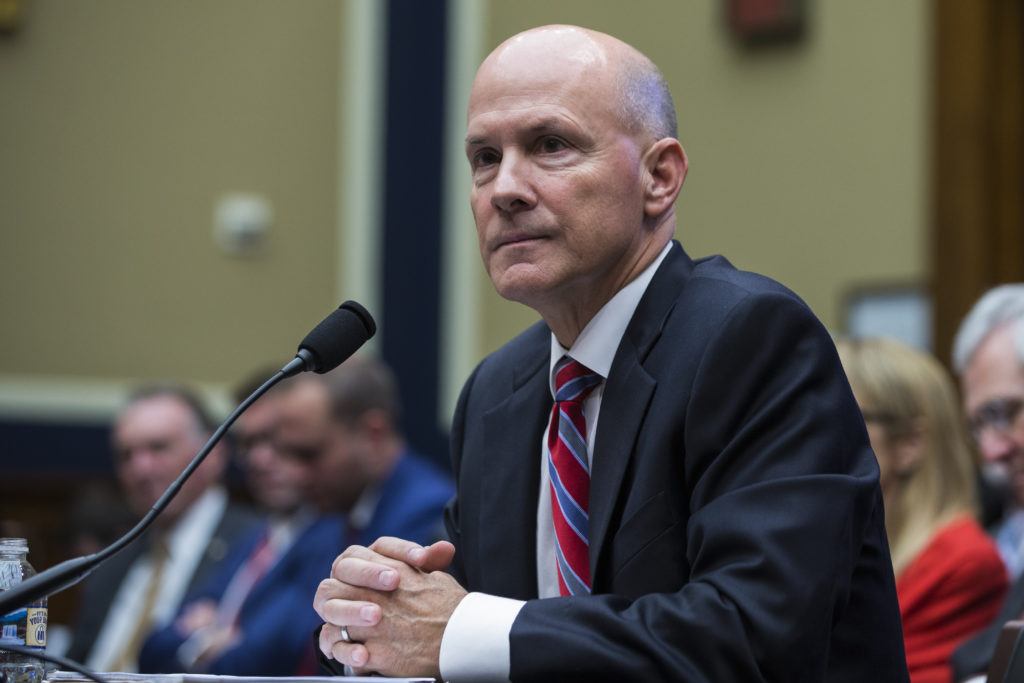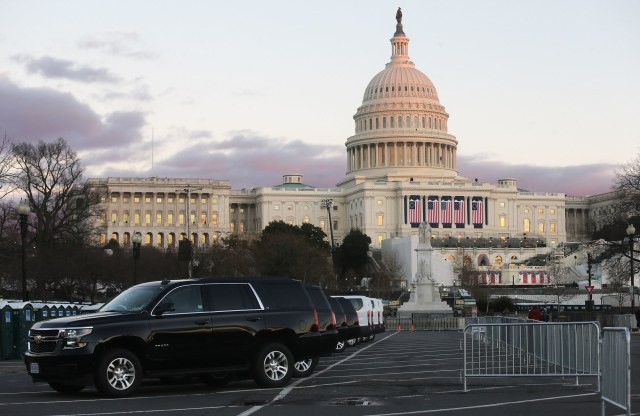President Trump’s inauguration committee raised a record $100 million-plus. Wealthy individuals and corporations spend billions a year trying to influence government decisions. – Credit: Mario Tama/Getty Images
“Supplied controlled substances in support of criminal diversion activities.”
“Failed to review orders for suspicious activity.”
“Ignored own procedures designed to prevent diversion.”
These are statements from a Drug Enforcement Agency (DEA) memo, published last weekend by The Washington Post, detailing the findings of a two-year inquiry into America’s largest drug distributor, McKesson Corporation. It concerns the distribution of opioid drugs, the powerfully addictive painkillers currently ravaging the US.
Almost 100 people die every day from opioids and prescription opioids have become a gateway drug to heroin. Opioid-related deaths are so common, in fact, that state health departments have resorted to encouraging citizens to carry an antidote in case they come across an addict who has overdosed. It is no exaggeration to say that the opioid epidemic is devastating families, communities, and even entire states (West Virginia received 780 million pills in just 6 years, distributed by companies such as McKesson – as the Post points out, that’s “433 doses for every man, woman and child”).
McKesson was found to have been sending quantities of pills to small town communities that would have been typical of shipments to large city drugstores adjacent to medical centres. One pharmacist, based in a small suburb outside of Denver, Colorado, sold up to 2,000 pills a day. A Colorado grand jury indicted him on drug trafficking charges for which he is now serving a 15-year sentence. The indictment states:
“The Grand Jury learned of evidence demonstrating that Clawson’s Platte Valley Pharmacy engaged in the regular purchase of Oxycodone from McKesson that was either unusually large, unusually frequent, and/or which substantially deviated from the normal pattern typically observed for comparable pharmacies in the area in and around Brighton. Colorado. From 2008-2011 the percentage increase for Oxycodone 30 mg orders supplied by McKesson to Platte Valley Pharmacy was approximately 1,469%.”
McKesson was not charged in the Colorado indictment.

That is just one example of McKesson’s failure to act on suspicious orders. The DEA investigation, covering nine field offices, resulted in a $150 million settlement with McKesson. But according to 60 minutes correspondent Bill Whitaker, that settlement is “the story of a company too big to prosecute”.
McKesson is not the first multi-billion-dollar corporate to fall into ‘the too big to properly punish’ category. They won’t be the last. That’s what happens when big business becomes all powerful; when corporate donations buy the rule-makers and the revolving door of jobs dangles the possibility of lucrative post-government employment.
****
David Schiller, the 30-year DEA veteran who led the investigation into McKesson, is blunt in his assessment of the $200 billion a year firm: “‘They’re killing people’. And their motive? This is all for financial gain.”
Joint reporting by The Washington Post and 60 minutes, based on the whistle blower testimony of Schiller and his fellow former-DEA agents, suggests an unwillingness among senior government prosecutors to take a hard line against company number five of the Fortune 500. Schiller says he and his team wanted a $1 billion fine, the cancellation of distribution warehouse ‘registrations’ (which allow firms to supply controlled drugs), and criminal proceedings against executives.
For the DEA agents, that scale of punishment was appropriate: their investigations uncovered repeated failings to act on suspicious pharmacy orders – orders that ended up on the black market – and the fact that the firm had been fined over $13 million just a few years earlier… for exactly the same behaviour.
Instead, two-year-long negotiations with McKesson lawyers resulted in the $150 million settlement (still a record, though a drop in the ocean for a firm whose fourth quarter fiscal 2017 revenues were almost $50 billion) and ‘suspended’, rather than ‘surrendered’, registrations – meaning no need to reapply to dispense the drugs, which would have triggered new inspections.
A McKesson spokeswoman told the Post: “We categorically deny any criminal intent or the violation of any criminal law in our handling of opioids, and in our discussions with the government, they never suggested otherwise.” And in a statement in response to the joint reporting refuted “unsubstantiated accusations”.
The company has, nonetheless, agreed to an independent monitor to ensure compliance, which the US Department of Justice says is “the first… of its kind in a CSA [Controlled Substances Act] civil penalty settlement”.[3. Office of Public Affairs, ‘McKesson agrees to pay record $150 million settlement for failure to report suspicious orders of pharmaceutical drugs’, US Department of Justice, 17 January 2017]
A different standard for big business
In his 60 minute interview, Schiller asks “In the height of the epidemic, when people are dying everywhere, doesn’t somebody have to be held accountable?” Too often, when it comes to corporate misbehaviour, the answer seems to be a half-hearted ‘sort of’.
Just look at the banks, whose reckless behaviour precipitated a recession, the aftermath of which is still felt today. In the US, just one Wall Street banker, a senior trader at Credit Suisse, was jailed for his actions; in the UK, no one has been imprisoned.
Prosecutors have argued no laws were broken, so why the enormous pay outs? According to one analysis, between 2009 and 2015, 49 financial institutions collectively paid government entities and private individuals $190 billion. JP Morgan Chase alone settled a Department of Justice case for $13 billion in 2013.

Or consider the recent, massive data breach at Equifax, the credit rating agency – compromising the sensitive, personal information of over 140 million Americans. Despite what Massachusetts Attorney General Maura Healey dubbed a “brazen failure to protect consumer data”, no executives have been criminally prosecuted for their negligence.[1. Executives who sold their shares before the breach became public may be punished for insider trading.] Those Americans will have to live with the threat of identity fraud, and all the associated risks, for many years to come.
Let’s be clear, the failure to prosecute richly-remunerated executives that preside over massive corporate failures is not due to lack of legal recourse. The Responsible Corporate Officer Doctrine (RCOD) enables executives to be held to account for criminal activity within their company, regardless of whether they were aware of it. In fact, in May the Supreme Court declined to review a decision by the Eight Circuit court of appeal which had upheld RCOD sentences for two commercial farm executives (serving short prison sentences for the sale of salmonella-contaminated eggs), effectively confirming the use of RDOC in instances of negligence.[2. Michael W. Peregrine, ‘The “Responsible Corporate Officer Doctrine” Survives to Perplex Corporate Boards’, Harvard Law School Forum on Corporate Governance and Financial Regulation, 5 July 2017]
Follow the money
“…escalating campaign contributions, as well as burgeoning ‘independent’ campaign expenditures… growing lobbying prowess… platoons of lawyers and paid experts to defend against or mount law suits, so that courts interpret the laws in ways that favour them; additional lawyers and experts to push their agendas in agency rule-making proceedings; the prospect of (or outright offers of) lucrative private-sector jobs for public officials who define or enforce the rules in ways that benefit them…”
That is economist Robert Reich’s description of how big business has captured not just economic, but political power.

The money spent on lobbying and campaign contributions is eye-watering. Here are some examples of the sums involved:
- In 2016, for example, $3.15 billion was spent on lobbying.
- During the 2016 election cycle, members of the powerful House Ways and Means Committee – responsible for tax legislation – received almost $50 million in PAC donations.
- Also over the 2016 election cycle, Super PACs spent in excess of $1 billion.
Big business spends big bucks to get their way, with legislators increasingly beholden. And the revolving door between business, politics and regulators further cements this crony capitalism, making independent action all the more difficult.
Consider this: in the wake of the financial crash, when congress was developing its banking reforms, the sector deployed 3,000-plus lobbyists – and more than half of them had previously worked in the legislative or executive branch of government. As the Centre for Public Integrity’s analysis points out, that’s five lobbyists per congressman.
For big corporates, this is core business expenditure. McKesson is no different. It spent $1.7 million on contributions in the 2016 election cycle, and between 2010 and 2016 spent almost $12 million on lobbying. In 2015-2016, according to Open Secrets, 17 of their 23 lobbyists had previously held government jobs. The Washington Post notes that Geoffrey Hobart, McKesson’s lead attorney during the settlement process, was a former federal prosecutor, now a partner at one of Washington’s top law firms.
What is the quid pro quo of hefty donations if not influence? Why spend millions on lobbying if not to affect decision-making? Just look at the Republican tax bill and its lavish tax breaks for big business and the super rich. Why hire former insiders if not to benefit from that insider’s knowledge and relationships. It’s not illegal, in fact its rational behaviour on the part of business, but that doesn’t make it right – it compromises politicians and regulators.
Ordinary citizens, without the wealth and networks of top corporates, cannot possibly compete – yet a democracy is supposed to be run in their interests, decisions made on the basis of their collective values. 84% of Americans think money has too much influence in political campaigns – in fact that influence extends far beyond an election.
“Government of the people, by the people, for the people”. That was Lincoln’s immortal phrase. Crony capitalism has moved America a long way from that.









Join the discussion
Join like minded readers that support our journalism by becoming a paid subscriber
To join the discussion in the comments, become a paid subscriber.
Join like minded readers that support our journalism, read unlimited articles and enjoy other subscriber-only benefits.
Subscribe